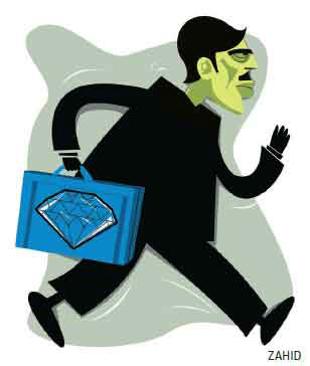
MUMBAI: About six years ago, two Englishmen from Kiln, a member of the famed Lloyds reinsurance market in London, undertook an unusual journey in India. They joined a group of unassuming men in the crowded Mumbai Central railway station to board a sleeper coach in the evening train to Surat. Each carried a handful of uncut, rough diamonds tucked into concealed pockets in shirts and jackets. The next day, they took the train back to Mumbai carrying a consignment of polished stones. The guests were flummoxed by what they saw. Their companions, collectively carrying Rs 50-100 crore worth cargo, whiled away the time, chatting and playing cards, before taking the public transport to factories where trained craftsmen turned the roughs into more sparkling stones with the right colour and carat. No questions were asked. No armed guards escorted them.
The men from Lloyds were trying to figure out the reinsurance risk of such consignments. "They wanted a feel of the operations. They couldn't believe what they saw, but soon sensed that was the way business happens here. It's a unique system," said Khushal Jhaveri of Unilight Insurance Brokers. For generations, men, many from Gujarat's Mehsana district, have been 'Angadias' - unofficial, trusted couriers who ferry diamonds, jewellery and cash. Last week, when sleuths from the income-tax department, which for months had been probing a money laundering racket, confiscated the cargo of Angadias, there was panic in the diamond hub. An email from a Lloyds syndicate member enquired whether this was a one-off event or the very business was under threat?
The fear dispelled within days after the tax office released most of the cargo. Since Tuesday, the Angadias have been once again hanging around in the bylanes and 'khaogalis' of the diamond district before boarding the evening train to Surat.
But few outside the club of diamantaires know that what may have been a clincher for the trade and the ancient profession of Angadias is a sheaf of yellowing papers that outlined, 25 years ago, peculiar ways of the trade. At that point, a group comprising the then income-tax commissioners of Bombay, commerce ministry officials, senior chartered accountants and members of the trade had jointly agreed to certain rules of the game. The effort was aimed at explaining tax officials the intricacies of the trade and making life simpler for traders and couriers.
The Angadias carry with them pieces of papers, better known as 'jungad' slips in trade parlance. These slips are kachcha delivery challans that are either handwritten or computer printouts. In March 1985, the guidelines framed by the group laid down that jungad slips would be accepted as "proof of ownership" of the goods if the details given in the slips tally with the entries made in outward registers of the owners of the goods "as well as the persons in whose custody the diamonds are found". At that point, tax authorities were explained that there were times when the entire packet of diamonds could not be sold as a whole and the customer would pick some stones while the remaining are returned to the traders.
It's common practice for a trader to mix unsold stones with stones in other packets before sending them out again for customer approval. Such is the nature of the trade that taxmen had then appreciated the fact that maintenance of an outward register showing movement of every piece of diamond was not feasible.
The purpose was to avoid the possibility where even when there is a genuine transaction, the diamonds found in the possession of a person may be seized by income-tax authorities merely on the ground that the trader has not maintained an outward register.
In the close-knit world of diamond traders and Angadias, some things do not change. When tax authorities clamped down on the Angadias last week, the traders dusted off the old 'agreement'. "This (agreement) happened many years ago. It's natural that the current tax officials are not aware of its existence. We showed them the papers. That helped," said Vipul Shah, who heads the diamond firm Asian Star Co. Shah, who is also the chairman of The Gem and Jewellery Export Promotion Council, said that "business was once again normal".